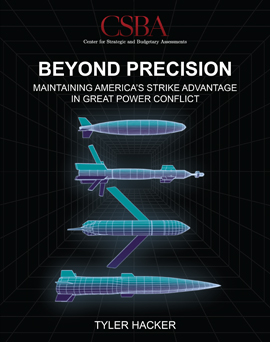Tyler Hacker

The United States' (U.S.) provision of weapons to Ukraine over the last year has raised critical questions about the overall supply of Western munitions and the ability of the weapon industrial base to meet the munitions demands of contemporary conflict. Although war in Ukraine has focused the world’s attention on the munitions issue, a survey of previous U.S. strike operations reveals that the U.S. has struggled to meet PGM demands in nearly every major campaign undertaken since their adoption. Looking to the future, simply producing and procuring more PGMs may not be enough to satisfy the requirements of a near-term great power conflict given current fiscal, industrial, and political constraints.
In Beyond Precision, CSBA Research Fellow Tyler Hacker examines five potential conflict scenarios in the Indo-Pacific region to highlight essential PGM types and identify capability and capacity gaps in the current U.S. PGM portfolio. Finding both insufficient on-hand inventories and inadequate production capacity, Hacker explores several approaches the United States could take to maintain its precision-strike advantage. He also challenges current assumptions about munitions production and consumption and assesses how U.S. strategy may need to adapt depending on conflict duration, operational objectives, and other scenario variables. Finally, Hacker provides near and long-term recommendations to maintain the U.S. precision-strike advantage well into the future.
Download full “Beyond Precision: Maintaining America's Strike Advantage in Great Power Conflict” report.
No comments:
Post a Comment